How can we say "del revés" en inglés? Here's the answer
Pestañas
Wednesday 11 November 2015
Tuesday 10 November 2015
Monday 9 November 2015
High School Trivial
From November we will pose a question each week for the students to find out.
Let's see who finds the most answers!
WEEK 1
Name the film where this sentence appears. Explain why.
Let's see who finds the most answers!
WEEK 1
Name the film where this sentence appears. Explain why.
WEEK 2
There is a special commemoration in November 11th. What is that commemoration? What is the flower in the pictures? Why is everybody wearing that flower?
WEEKS 3 AND 4
A country and an animal share their name. Name the country and the animal.
How are the following words related to Thanksgiving?
Plymouth
James 1st
Mayflower
Franklin D. Roosevelt
Macy's
Black Friday
The day before and after Thanksgiving are remarkable for something. For what?
Monday 2 November 2015
Modals and modal perfect verbs
MODAL VERBS
Los Verbos Modales
MODAL
|
EXAMPLES
|
USES
|
CAN
|
He can find any street in London.
You can take a taxi.
Can you take me to Victoria Station? |
Ability
Suggestion
Request
|
BE ABLE TO
|
He is able to find any street in London.
|
Ability
|
CAN ́T
|
That story can ́t be true.
|
Certainty that something is
impossible
|
COULD
|
I could play tennis when I was younger.
Could you take me to Victoria Station?.
You could take a taxi.
|
Ability
Request
Suggestion
|
MAY
|
It may be quicker to travel by train.
May I come in?.
|
Possibility
Formal request
|
MIGHT
|
It might be quicker to travel by train.
|
Possibility
|
MUST
|
You must be back at 10 o ́clock.
Look at the snow. It must be cold outside. |
Obligation
Certainty that something is true |
HAVE TO
|
You have to be back at 10 o ́clock.
|
Obligation
|
NEED TO
|
You need to study a lot.
|
Obligation
|
NEEDN ́T
|
You needn ́t have a university degree.
|
Lack of obligation
|
MUSTN ́T
|
You mustn ́t drive without a licence.
|
Prohibition
|
DON ́T HAVE TO
|
You don ́t have to call a taxi.
|
Lack of obligation
|
SHOULD
|
You should drive more carefully
|
Opinion / Advice
|
OUGHT TO
|
You ought to drive more carefully
|
Opinion / Advice
|
CARACTERÍSTICAS DE ESTOS VERBOS:
No llevan -s en la tercera persona del singular del presente simple.
No necesitan -do o -does para formar la negativa ni la interrogativa.
Nunca llevan infinitivo con to detrás, excepto be able to, need to, have to y ought to.. No tienen infinitivo, participio ni tiempos compuestos.
NOTA: Los verbos have to y need to también se consideran “verbos semimodales” porque no cumplen todas las características propias de los verbos modales.
CAN / BE ABLE TO
CAN se auxilia de be able to en los tiempos de que carece, y tiene muchos usos:
a) Para expresar habilidad o capacidad: “saber”, “poder”.
b) Con acciones que empiezan en el pasado pero todavía tienen continuidad en el presente. c) Para hacer peticiones, dar y pedir permiso de manera informal.
d) Para indicar posibilidad:
We can do that later. (Podemos hacer eso luego). En negativa tiene, además de estos, otros dos usos:
e) Para expresar deducción. f ) Para indicar prohibición.
You can ́t smoke here. (No puedes fumar aquí).
BE ABLE TO también indica habilidad y posibilidad como can, pero en los tiempos que le faltan
a este verbo modal.
Will you be able to do it before six o ́clock?. (¿Podrás hacerlo antes de las 6?)
COULD
a) Se usa para expresar habilidad y capacidad en el pasado.
b) Para hacer peticiones o pedir un favor de manera más formal que con can.
c) Para hacer sugerencias.
d) Para indicar posibilidad, pero dando a entender que es más remota que si usamos can.
We could go on friday afternoon.. (Podríamos ir el viernes por la tarde).
MAY / MIGHT
a) Ambos verbos expresan la posibilidad de que algo ocurra en el presente o en el futuro, sin ser seguro. Como hemos visto antes, can también expresa posibilidad pero denota que las circunstancias reales lo permiten.
b) May también se utiliza para pedir y dar permiso de una forma más educada que con can.
CAN se auxilia de be able to en los tiempos de que carece, y tiene muchos usos:
a) Para expresar habilidad o capacidad: “saber”, “poder”.
b) Con acciones que empiezan en el pasado pero todavía tienen continuidad en el presente. c) Para hacer peticiones, dar y pedir permiso de manera informal.
d) Para indicar posibilidad:
We can do that later. (Podemos hacer eso luego). En negativa tiene, además de estos, otros dos usos:
e) Para expresar deducción. f ) Para indicar prohibición.
You can ́t smoke here. (No puedes fumar aquí).
BE ABLE TO también indica habilidad y posibilidad como can, pero en los tiempos que le faltan
a este verbo modal.
Will you be able to do it before six o ́clock?. (¿Podrás hacerlo antes de las 6?)
COULD
a) Se usa para expresar habilidad y capacidad en el pasado.
b) Para hacer peticiones o pedir un favor de manera más formal que con can.
c) Para hacer sugerencias.
d) Para indicar posibilidad, pero dando a entender que es más remota que si usamos can.
We could go on friday afternoon.. (Podríamos ir el viernes por la tarde).
MAY / MIGHT
a) Ambos verbos expresan la posibilidad de que algo ocurra en el presente o en el futuro, sin ser seguro. Como hemos visto antes, can también expresa posibilidad pero denota que las circunstancias reales lo permiten.
b) May también se utiliza para pedir y dar permiso de una forma más educada que con can.
MUST / HAVE TO
Must sólo tiene presente, así que para el resto de los tiempos se usa have to.
a) Los dos verbos expresan necesidad y obligación, pero con must la necesidad es más fuerte.
Cuando queremos suavizar la frase utilizamos have to.
You must take a decision as soon as possible. (Debes tomar una decisión lo antes posible) She has to work tomorrow. (Tiene que trabajar mañana)
b) Must sirve para expresar una conclusión lógica.
NEED TO / NEEDN ́T
a) Need to expresa obligación o necesidad.
b) Needn ́t indica ausencia de obligación o necesidad.
MUSTN ́T / DON ́T HAVE TO
a) Mustn ́t indica prohibición.
b) Don ́t have to tiene un valor totalmente distinto pues significa ausencia de necesidad, igual
que needn ́t.
You don ́t have to wash the dishes. (No tienes por qué lavar los platos / no es necesario).
SHOULD / OUGHT TO
a) Se pueden utilizar indistintamente para dar consejos y hacer recomendaciones, aunque should es mucho más frecuente. Ought to apenas se usa en negativa e interrogativa.
MODAL PERFECTS
Los Verbos Modales Perfectos
Must sólo tiene presente, así que para el resto de los tiempos se usa have to.
a) Los dos verbos expresan necesidad y obligación, pero con must la necesidad es más fuerte.
Cuando queremos suavizar la frase utilizamos have to.
You must take a decision as soon as possible. (Debes tomar una decisión lo antes posible) She has to work tomorrow. (Tiene que trabajar mañana)
b) Must sirve para expresar una conclusión lógica.
NEED TO / NEEDN ́T
a) Need to expresa obligación o necesidad.
b) Needn ́t indica ausencia de obligación o necesidad.
MUSTN ́T / DON ́T HAVE TO
a) Mustn ́t indica prohibición.
b) Don ́t have to tiene un valor totalmente distinto pues significa ausencia de necesidad, igual
que needn ́t.
You don ́t have to wash the dishes. (No tienes por qué lavar los platos / no es necesario).
SHOULD / OUGHT TO
a) Se pueden utilizar indistintamente para dar consejos y hacer recomendaciones, aunque should es mucho más frecuente. Ought to apenas se usa en negativa e interrogativa.
MODAL PERFECTS
Los Verbos Modales Perfectos
MODAL
|
EXAMPLES
|
USES
|
MUST HAVE
|
The driver must have lost his way.
|
A certainty or logical
conclusion about an event in
the past.
|
MIGHT / MAY HAVE
|
She might / may have bought a new car.
|
A guess about something which
happened in the past.
|
COULD HAVE
|
You could have avoided that accident.
|
The ability to do something in
the past, but which in the end
was not done.
|
COULDN ́T HAVE
|
He couldn ́t have known about the
problem.
|
A certainty that something did
not happen.
|
SHOULD HAVE
|
He should have listened to me.
They should have won the competition. |
Advice which was not followed
in the past.
Expectations which were not fulfilled in the past. |
SHOULDN ́T HAVE
|
You shouldn ́t have gone on foot.
|
Criticism that was given after
an event.
|
Must have + participio
Se usa para expresar certeza o una conclusión lógica sobre un hecho pasado.
Might / May have + participio
Se usa para hacer una predicción sobre algo pasado.
Could have + participio
Indica que hubo la posibilidad de haber hecho algo en el pasado pero que finalmente no se hizo.
Couldn ́t have + participio
En negativa expresa la imposibilidad de que el hecho enunciado se realizara.
Should have + participio
Se usa para lamentar que algo no ocurriera en el pasado y que no se haya cumplido lo que esperábamos.
Shouldn ́t have + participio
Con este modal expresamos nuestra opinión crítica sobre un hecho pasado indicando que no debería haber ocurrido.
And now, a couple of pageswith lots of exercises to practise:
http://www.perfect-english-grammar.com/modal-verbs-exercises.html
http://www.englishpage.com/modals/modalforms.html
Se usa para expresar certeza o una conclusión lógica sobre un hecho pasado.
Might / May have + participio
Se usa para hacer una predicción sobre algo pasado.
Could have + participio
Indica que hubo la posibilidad de haber hecho algo en el pasado pero que finalmente no se hizo.
Couldn ́t have + participio
En negativa expresa la imposibilidad de que el hecho enunciado se realizara.
Should have + participio
Se usa para lamentar que algo no ocurriera en el pasado y que no se haya cumplido lo que esperábamos.
Shouldn ́t have + participio
Con este modal expresamos nuestra opinión crítica sobre un hecho pasado indicando que no debería haber ocurrido.
And now, a couple of pageswith lots of exercises to practise:
http://www.perfect-english-grammar.com/modal-verbs-exercises.html
http://www.englishpage.com/modals/modalforms.html
Monday 26 October 2015
Feelings
http://www.learn-english-have-fun.com/emotions-vocabulary.html
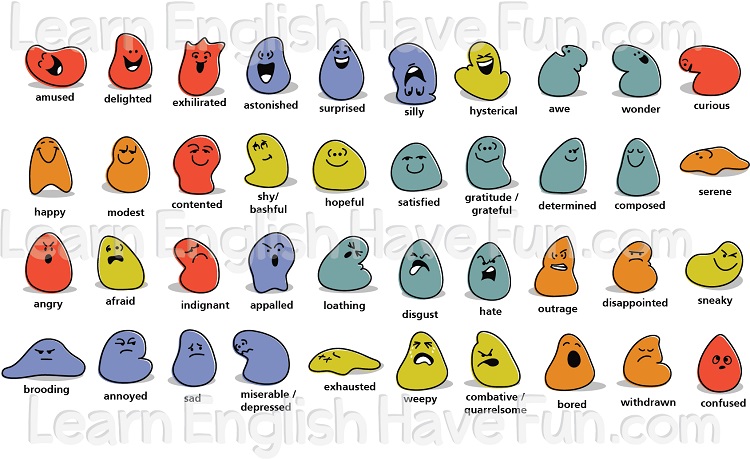
Feelings & Emotions Vocabulary

[Note: This vocabulary pronunciation is in American English]
Emotions vocabulary words can be really important in describing how we feel and how others are feeling. Most of us know the emotional states happy and sad, but what about determined and resentful? Hopefully this list of words will help expand your vocabulary.
The video provides a chance to hear each word pronounced and there is a pause after each word so that you can say the words to practice your pronunciation.
When you're finished, leave a comment below to let us know how you are feeling today.
Definitions of Emotions Vocabulary
Now that you've heard the words pronounced, you may still need some help with the definitions of these emotions vocabulary words. Some of the words are similar. All are just various degrees of our positive and negative feelings and emotions.
 |
feeling fear or being worried about something.
|
 |
to feel entertained so that you laugh or smile at something.
|
 |
to feel dislike because of something or someone, to feel annoyed.
|
 |
to feel slightly angry or irritated at someone.
|
 |
feeling great shock or disgust at something or someone.
|
 |
feeling great surprise.
|
 |
feelings of great respect and a little fear because you really respect someone.
|
 |
tired and annoyed because you are uninterested in something.
|
 |
very serious, sad and threatening.
|
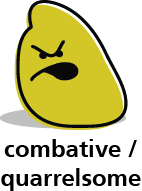 |
wanting to have an argument or fight with someone.
|
 |
calm and having one's feeling under control.
|
 |
not able to think clearly or understand.
|
 |
(contented / content / contentment)
feeling happiness or satisfaction.
|
 |
(curious / curiosity)
wanting to know about something or someone.
|
 |
(delighted / delight)
very pleased or happy.
|
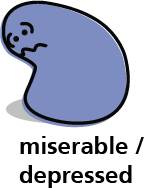 |
sad and without hope.
|
 |
feeling very strongly that you will do (complete) something you decided to do.
|
 |
feeling sad and unhappy that something did not happen or did not happen in the way that you wanted or expected.
|
 |
a strong feeling of disapproval or dislike, especially for something that looks, smells, tastes (etc.) unpleasant.
|
 |
extremely tired, completely without energy.
|
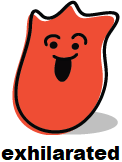 |
very happy and excited.
|
 |
feeling thankful for something.
|
 |
feeling pleased or pleasure.
|
 |
very strong dislike.
|
 |
full of hope, feeling that something you want is going to happen.
|
 |
in a state of uncontrolled laughter or extreme excitement.
|
 |
very angry because of something that is unfair or wrong.
|
 |
a feeling of hatred or strong dislike.
|
 |
not being too proud or talking very much about your abilities, qualities or possessions.
|
 |
a strong feeling of shock and anger.
|
 |
unhappy.
|
 |
feeling happy about something that happened or pleased that you did something the way you wanted to.
|
 |
calm and peaceful.
|
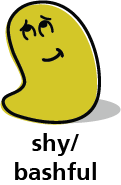 |
feeling nervous or uncomfortable meeting or talking to other people.
|
 |
playful, having fun and not serious.
|
 |
behaving in a secret and dishonest way.
|
 |
feeling or showing surprise about something you did not expect to happen.
|
 |
sad and crying or feeling ready to start crying.
|
 |
very quiet and not wanting to talk to others.
|
 |
a feeling caused by seeing something amazing, beautiful, special or surprising.
|
So.... how are you feeling today? Leave me a comment below!
I hope that review of emotions vocabulary was helpful. Now, it's your turn. So how are you feeling today? Leave a comment below to practice your English. Remember, practice is the only way to improve your English!
Subscribe to:
Posts (Atom)

New! Comments
Have your say about what you just read! Leave me a comment in the box below.